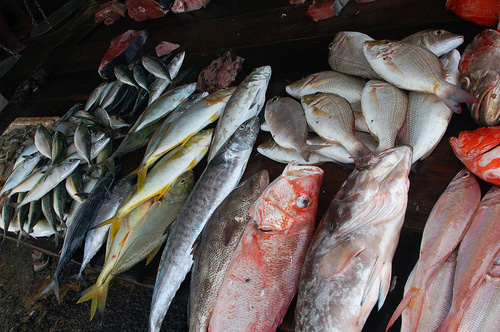In the Sri Lankan city of Batticaloa, an American peace worker watches one woman bravely face the worst the world can offer.
“Affliction,” wrote Simone Weil, “introduces into the soul of a finite creature the immensity of force, blind, brutal and cold.” This sentence ran through my mind in 1992 as I went about interviewing Tamils in Batticaloa, the capital of Sri Lanka’s eastern province.
Beneath Batty’s diurnal routine of women doing their marketing, fishermen delivering the morning’s catch, a father on a bike taking his child to a school, I noted pervasive angst—a hunched woman scanning her surroundings, a man glancing over his shoulder, wary, as though at any moment something out of the ordinary, say a grenade tossed into a tea shop, might suddenly blast apart the day. The war between the Sinhalese government and the Tamil/Muslim minority was there like weather, something you could ignore only in snatched moments. When it impinged, up rose Weil’s observation.
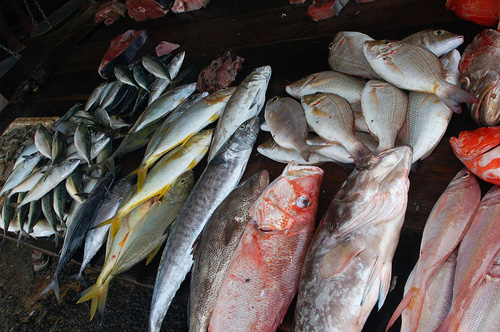
Photo by UrbanGarden via Flickr.
I was working for Peace Brigade International (PBI), an NGO whose unarmed volunteer bodyguards protected human rights activists in Guatemala, El Salvador, and Haiti. The Sri Lankan government disappeared journalists, union leaders, and human rights advocates, and when six lawyers prosecuting human rights cases were murdered, the Bar Association invited PBI to the island. The northern province, Tamil Tiger headquarters, was an official war zone and off limits, but the eastern province wasn’t, and I was in Batty to see if PBI might be useful there.
I met Rajeswary on my second day at Suriya, a local NGO dedicated to empowering women. She wore the white sari of a widow with aplomb. She did not exhibit the wariness I’d observed in others. I guessed she was in her early thirties, too young to be a widow whose husband had died of natural causes. And I was right. He’d disappeared.
Rajeswary’s husband worked in a dispensary in Batty. One evening, he closed up and walked with a friend to the checkpoint at the edge of town. This friend later told Rajeswary that they passed through the checkpoint together, and after they’d said goodnight, the friend had turned down a side lane to his house and her husband had continued on—but he never came home.
In Hindu, cosmology is governed by a stable, cool, male energy, and another that is active, hot, and female. At temple festivals, male priests are attendants in the service of local goddesses. They prepare the grounds for ceremonies and carry out the purification rituals that honor female energy. Rajeswary embodied that fiery energy. She wore a proud resolution: she would not bow down to the gods of war.
The island of Sri Lanka, formerly called Ceylon, was a colony of the Portuguese, Dutch, and then the Brits who granted it independence in 1948. The country is separated from the southern tip of India by a twenty-mile wide straight, and the Tamils on the island are descendents of Indian Tamils who’d crossed generations ago. Tamil Hindus make up approximately 20 percent of the population, Muslims, who are descendants of Middle Eastern traders, about 5 percent, and the remaining 75 percent of Sri Lankans are Sinhalese Buddhist, said to be descended from Aryans in northwest India who migrated to the island centuries ago. When the Brits left and the Sinhalese majority took over, they made Sinhala the country’s official language and consistently passed legislation that sidelined the Tamils. Though the Sinhalese vastly outnumber the Tamils on the island, some harbor apprehension that millions of Tamils from India’s southernmost province might decide to cross the narrow straight, join the few Tamils already here, and take over. This seemingly baseless fear is compounded by a perception that the Brits had favored Tamils, grooming them for coveted civil service posts, which required facility in English.
Language “wars” continued through the sixties and seventies, and though Sinhala, Tamil, and English are now all official languages, a final inequity, which enraged Tamils in the early ’80s, was the passage of legislation that required Tamils to score higher than Sinhalese on university entrance exams. A Tamil “liberation” movement formed and petitioned the government for redress, but things continued to deteriorate, and the ambush of a Sinhalese army convoy in Jaffna in 1983 sparked anti-Tamil riots that spread across the island, killing thousands of Tamils and torching homes and businesses. When government intransigence persisted, the movement became the Liberation Tigers of Tamil Eelam—Eelam means “homeland”—and it demanded independence for Tamils.
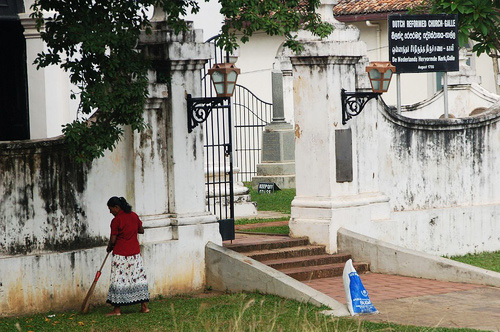
Photo by UrbanGarden via Flickr.
When I arrived in 1992, the country had just come through a decade of conflict in which not only Tamils but also Sinhalese youths who couldn’t find jobs had become targets of their government. They organized a protest movement, the JVP, which quickly turned Maoist militant. Because the government had passed a Prevention of Terrorism Act, modeled on the Brits’ PTA, which in effect legalized paramilitary death squads, the government had carte blanche to arrest and disappear thousands of the JVP’s young, embittered Sinhalese, and to continue its war against the Tamil opposition.
I guessed Rajeswary was in her early thirties, too young to be a widow whose husband had died of natural causes. And I was right. He’d disappeared.
“The Sri Lankan government has sworn to protect Tamils here from the Tamil Tigers,” says Sooza, a 6’2” Tamil ex-policeman, who ran The Lake View Inn beside Batticaloa’s lagoon flowing from the sea into the town’s center. “And the Tigers have sworn to protect us from the Sinhalese government. The economy is bad—no one invests where there’s war—plus we have to pay taxes to both government and the Tigers. The man I sent to the Tigers with my tax kept the money, so Tigers impounded my lorry, and my man tried to commit suicide. I’m paying his hospital bill, and I’ll have to pay the Tigers to return the lorry.”
Sinhalese government soldiers in uniform mass at the checkpoints beside the bridge through which Tamils and Muslims who live in outlying districts must pass and submit to search. The Tamil Tigers have both male and female recruits, and both genders sign up to be Black Tiger suicide bombers. The soldiers know this, and it makes them tense. Nestled in that Tamil girl’s bag of rice might be parts for making a bomb, or the bomb itself. No way to know, and not to know could cost your life.
“Muslims and Tamils who live in outlying villages,” Soosa said, “want to pass the checkpoints before dark. Because in daytime this is Armyland, and when sun sets it’s Tigerland. And since some of our ancestors married light-skinned British, Tamil skin now comes in many shades—and Tigers roaming in the dark might mistake you for a light skinned Tamil. So you must obey curfew.” He grinned. “Life is short, keep it sweet.”
Rajeswary told me that she lived in a refugee camp because her village had been attacked and destroyed. Please would I come and view this ruin? I would.
April is the hottest month in this equatorial country, and sweat was the order of the day. On the way to her village, she explained that within the Sinhalese/Tamil war a smaller but no less devastating conflict had flared between Tamils and the few Muslims who live in the eastern province.
“The government wants Tamils and Muslims to fight each other instead of fighting the Sinhalese army,” Rajeswary said.
Divide and conquer: I flashed on the grenade I’d heard was tossed into a tea shop on Batty’s main street. Muslims will think a Tamil did it, I was told, either a Tamil civilian or a Tamil Tiger—but it might have been a Sinhalese soldier instead, deliberately inciting trouble.
The modest dwellings in Rajeswary’s village had been reduced to concrete foundations surrounded by rubble. We crossed the threshold of what had been her house. The walls were gone, and the roof had been blasted off—the concrete floor a desolation strewn with dry leaves.
“Muslim Home Guards did this,” she said. “Tigers the day before had attacked a Muslim village. So the Muslim Home Guards wanted revenge.”
We went into the yard. Rajeswary gestured toward the well, its rim broken.
“Women here are angry at Sinhalese soldiers who shoot any Tamil they suspect is a Tiger. And angry at Tigers because they steal our children to be their fighters. A whole generation of children is growing up without school. Now, just like the army, Muslim Home Guards think all Tamils are Tigers. The Home Guards killed my two daughters and one of my sons, and why? So that these children will not grow up and join the Tigers.”
I squatted and picked up a shard, one side pale blue plaster—from a bedroom wall?—and held it in my hand, as though if I could, I would from this shard rebuild.
“When my husband didn’t come home, I could not leave the children. And we cannot go out into the dark. The next day I brought a neighbor’s husband with me to the army camp’s prison. The sergeant said that they took no prisoners the previous evening.”
The day before in Batty and surrounding villages, soldiers searched house to house during daylight. That night, Tigers slipped into town and stole bikes, chickens, clothes drying on a line. Three Tigers commandeered a Tamil woman to cook a meal for them.
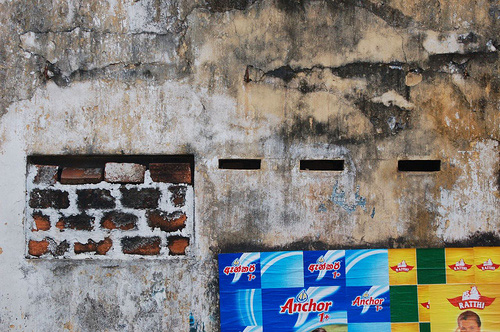
Photo by UrbanGarden via Flickr.
I had interviewed the Chairman of Batty’s Peace Committee—he who recorded the district’s disappearances. He sat at a desk and opened the ledger of detainees’ names. He’d begun this accounting on September 5, 1990, when the army arrested 156 people at Eastern University Refugee Camp.
The government had passed a Prevention of Terrorism Act, which in effect legalized paramilitary death squads. The government had carte blanche to arrest and disappear thousands.
“On September 9th, they arrested 170 more.” He was a solemn man, and he paused to let these facts resonate. “In the last two years in Batty district alone, 3,888 more persons have gone missing.”
You can be kidnapped by Tigers who hold you for ransom until someone in your family pays, or because the Tigers want you to enlist in their ranks. You can disappear because a Tiger decides to rob you and you resist. You can disappear because a Sinhalese soldier suspects you’re a Tiger. You can disappear because you voice disagreement with some government policy. You can disappear because you have a reputation as a comer who just might win a seat in the next parliamentary election. You can disappear because you write frank articles for a newspaper. You can disappear because soldiers round up groups of Tamils for “interrogation.”
He pointed at a name, then spoke this name, and another, and another. As though an incantation of names here in this sunlit room might call the disappeared into being.
“Our government acknowledges holding only one person. But we saw the arrests take place. Still none have been released. People have stopped telling me of disappearances because it’s futile.”
I walked with Rajeswary from her ruined village to the refugee camp where she lived, talking the price of rice and oil, the responsibilities of children. The camp was enclosed by the usual cadjun wood fence. Each family had a small hut with a corrugated metal roof. Inside, she invited me to sit on a woven mat.
“How long will you wear the white sari?” I asked.
“The custom is to wear it for a year. Already two years have passed.”
From beneath a blanket she retrieved a photograph. Two girls with blue plastic hairclips doing big smiling. An older boy, serious, a younger boy smiling like his sisters.
“Before the attack on our village, I had four children,” she said. She pointed to the youngest boy’s joyous face. “Now I have this one son left. He is ten. His name is Poniah. The day the Home Guards attacked, he was at cricket practice, and I had gone to the market to buy rice. But the other children were in the village with my neighbor when the Home Guards came.” She paused. “Perhaps I will wear the white sari always.”
Later in the week, Rajeswary invited me to the camp and we cooked. Her rice pot was big and sturdy—it had survived the Muslim Home Guards’ attack. When Poniah came from cricket practice, he helped us start the fire. His shy smile flashed. He was a beautiful boy, lithe, with a careful gentleness. After we ate, he went outside to find his friends, and Rajeswary warned: Do not leave the camp!
Through the doorway, heat lighting flared. Its jaggedness fit my nerves.
Rajeswary took out needle and thread and began to sew up a rip in my bag. Sri Lanka’s Black Tigers perfected suicide bombing long before it appeared in other places. I wonder about the effects of colonialism. If the Portuguese, Dutch, and Brits had stayed away, might this country have devolved into another Costa Rica, a country without an army?
“In the last two years in Batty district alone, 3,888 more persons have gone missing,” says the Chairman of Batty’s Peace Committee.
“Sometimes a girl from the high school doesn’t come home,” Rajeswary said. “Was it Tigers, or army soldiers? Yesterday, four Tamil fishermen disappeared. Maybe the army suspect them of being Tigers or harboring Tigers.” She paused, “There are many suicides now from grief. Many families have lost not one but six, seven, even more members. They cannot bear so many deaths in one family. They commit suicide by swallowing pesticide or the seeds of Alari blossoms.”
She handed me my repaired bag. “I think you don’t know the Hindu goddess Kannahi. When Kannahi’s husband squanders their money, the story goes, she suggests they sell one of her gold anklets. The husband takes the anklet to a goldsmith who has stolen a similar anklet from the queen. The smith tells the husband his wife’s anklet is too precious to sell to anyone but the royal family. The husband takes the anklet to the king, who accuses him of stealing the queen’s anklet and orders the husband beheaded.
“Kannahi goes to the king and throws down her other anklet. It breaks and spills out emeralds. Because the queen’s anklet had been filled with pearls, the king realizes his mistake. He’s sorry, but Kannahi is angry. She tears off her left breast, which burns with spiritual heat and hurls it at the king. The breast chases him through the palace pounding him like a fist. Then this breast sets fire to the city, sparing only the young, the old, and the innocent.” She smiled. “I will not do suicide. I will throw Kannahi’s burning breast.”
The next morning an upbeat Sooza waved a sheet of paper.
“Good news. Yesterday, Tigers ambushed the train going from Batty to Colombo. They were after Muslims. But the Tamil women took the puttu off their foreheads and put them on Muslim women’s foreheads. Muslim men hid their topis. When Tigers couldn’t find Muslims, they let the train go.” He shows me a flyer. “Muslims say Tamils on that train were brave. In this flyer, they thank us.”
This news of co-operation was heartening, a good omen, Rajeswary said. But at midnight at the army camp outside, Batty Tigers attacked. In the morning, Sooza announced nine Tigers dead, twenty-six soldiers.
“There will be reprisals,” he said.
Two days later in the late afternoon, Sooza’s manager came through the gate, sweating. He spoke urgently in Tamil.
“Like I told you,” Sooza says, “reprisals. The army chased Tigers through the coconut palm orchards. These are old orchards from long time ago, some planted by Catholic priests, some by Tamils, and still producing. Ancient trees, grandfather and grandmother trees. Army chased Tigers through orchards and Tigers escaped. Then army sergeant got mad. What to do with his fury? He ordered his men to cut the trees. Maybe they don’t want to, but he orders. Whole day they cut. Every tree. Now those trees lie on the ground, this sergeant’s dead Tigers.”
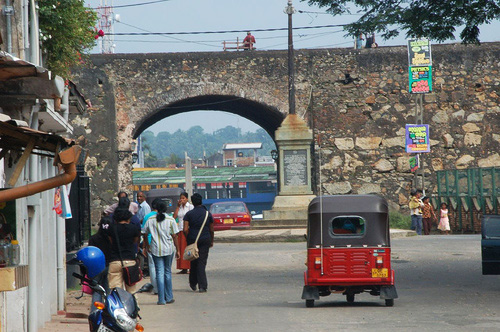
Photo by UrbanGarden via Flickr.
Just before I was set to go back to Colombo, Rajeswary and I planned a final meal. I had arranged to do an interview before dinner, so Rajeswary and I bought spinach, rice, and a fish, and when Poniah came from school, he and his mother headed for the camp. My interview ran for more than three hours, and as there are no phones in refugee camps, I was unable to call. When I finally arrived, I stepped into the sway of women’s voices keening like waves rolling in, depositing grief’s seaweed, and went to Rajeswary’s side. She sat up, lay her forehead against my breastbone.
When I got there, the soldiers had already returned and dumped Poniah’s body in front of the hut.
Rajeswary told me that after I left, Poniah had taken the fish and gone ahead to the hut to start the fire. A bit later, Rajeswary walked that same road past a gate where orange hibiscus blossoms were closing in dusk light. A lorry full of soldiers passed her, and behind it a jeep.
Rajeswary watched both lorry and jeep turn down the lane to the camp, and she filled with panic. She hurried to the turn, stepped off the road into the lane. She met people running away from the camp, urging her to turn back. She could see the soldiers fanned out through the camp, accosting the men, taking some back to the lorry. Two more soldiers climbed from the jeep, went into her hut, and dragged Poniah out. One tied a rope to the jeep fender. Another soldier held Poniah while a third tied the other end of the rope around Poniah’s ankle, then pulled on the knot to test it.
The lorry in front of the jeep was filling again with soldiers preparing to leave. Rajeswary ran to Poniah and tugged at the rope around his ankle. The lorry pulled out. She shouted and clawed at the knot, sobbing. Then the jeep jolted forward, and Poniah cried out. Rajeswary ran after the jeep, her scream unwinding toward those soldiers shouting at each other in that language no one here understood.
When I got there, the soldiers had already returned and dumped Poniah’s body in front of the hut. Others had helped her carry Poniah inside, and she’d covered him with one of her dead husband’s veshtis and collapsed on his body. Around us the wash of keening went on, one grievous breaker after another. Then Rajeswary turned again to Poniah’s body. I won’t forget her hand, smoothing that bloody raiment.
That was 1992. Through the nineties and into the new century, several Sri Lankan administrations presided over the increasing militancy of both sides. Colombo became a mass of checkpoints, but the Tigers managed to slip in all the way to the tourist hotel section and bomb the Central Bank, and Black Tiger suicide bombers went onto the air-field and decimated the Air Force planes. The government bombed Jaffna in the northern province and periodically raided Tamil enclaves in Colombo looking for militants and disappearing innocent Tamil civilians. Norwegian brokered peace talks during Chandrika Kumuratunga’s administration negotiated a ceasefire, but both the army and the Tigers violated it, and the talks collapsed.
Rajeswary and I had written to each other through the nineties. Then, in 2004, the tsunami hit, and Rajeswary’s letters stopped. When I visited the island in November of 2005, Sri Lankans told me that after the wave hit, both Sinhalese and Tamils had helped each other, and people hoped this cooperation might move the country toward a peaceful settlement of the conflict. The government and the Tamils agreed to share western tsunami aid equally, but soon after this agreement, monks from Sri Lanka’s militant Buddhist sangha petitioned the Supreme Court to rescind sharing of aid on grounds that this cooperation would give the Tigers too much legitimacy. The Court whose judges are Sinhalese ruled in their favor.
Now President Mahinda Rajapaksa has announced that he will end this war by completely wiping out the Tigers, but violence across the country and in Colombo continues. Two Red Cross workers at Colombo’s main railway station are dragged off and shot, seventeen Tamil employees at a French aid agency in the eastern province are murdered, and Foreign Minister Lakshman Kadirgamar steps from his swimming pool and becomes the highest ranking politician shot by a sniper.
Why is it, Schiller wrote, that we still remain barbarians? The U.N. has declared Sri Lanka one of the most dangerous countries for foreign aid workers, and the island has become a country under lockdown.
I traveled to Batty and saw what I’d seen before: white flags hung on a line stretched from one side of the road to the other signaling yet another funeral. Mines still detonated. Grenades still burst. At one refugee camp’s corrugated metal, two thousand men, women, and children sat in tropical heat. Some were refugees of war, some of tsunami. The women with infants looked like children themselves, stunted by years of malnutrition, married off young to escape recruitment by the Tigers. At ocean’s edge, the Hindu temple was wreckage. One huge hunk lay on its side. Smaller hunks fanned out to rubble bits. From the army camp’s practice range—gunshots.
A tattered banner lettered in Tamil script blew toward the water.
Tsunami comes, tsunami goes. War endures.
In Batty, a woman vendor in the fish market remembered me. I asked what she knew about Rajeswary.
“She has gone with the big wave,” the woman said. She told me that when the wave reversed and headed back toward open sea, some Tamils were swept from the lagoon toward open ocean. When the current carried them under the bridge, some grabbed hold of the pilings and held on. Above them, the lucky lowered ropes. But the clothing of some of those below had been stripped away, and Hindu modesty forbids nakedness. A few grabbed the ropes anyway and were rescued. The others clung to the pilings as long as they could. Then the wave swept them out. One of them was Rajeswary. I imagine her riding the tsunami wave and hurling her burning breast.
Marilyn Krysl’s work has appeared in The Atlantic, The Nation, The New Republic, The Pushcart Prize Anthology, Best American Short Stories and O. Henry Prize Stories. Her fourth collection of stories, Dinner with Osama (ND Sullivan Prize Short Fiction), won the Richard Sullivan prize in 2008, and Swear the Burning Vow: Selected and New Poems will appear in 2009. She has served as Artist in Residence at the Center for Human Caring, worked as a volunteer for Peace Brigade International in Sri Lanka, and volunteered at the Kalighat Home for the Destitute and Dying administered by Mother Teresa’s Sisters of Charity in Calcutta. In Boulder, she volunteers with the Lost Boys of Sudan and C-SAW, the Community of Sudanese and American Women.
To contact Guernica or Marilyn Krysl, please write here.

